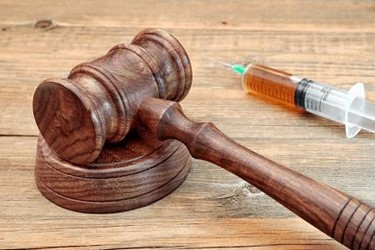The Complex Litigation Surrounding Remicade And Its Biosimilar Challengers
By Agnes Juang, Ph.D., and Daniel A. Kamkar, Knobbe Martens

Janssen Biotech Inc. and Celltrion Healthcare are engaged in a series of complex litigations over Janssen’s arthritis biologic medicine Remicade (infliximab) and Celltrion’s biosimilar. Because Remicade is classified as a biologic medicine, the relatively new Biologics Price Competition and Innovation Act (BPCIA) has required the two parties to proceed with a “Patent Dance” regulatory scheme alongside their litigation.1 However, because of the importance of the arthritis market to all interested parties, multiple courts are currently deciding multiple legal issues related to the Remicade medication. Below is a summary of the legal issues being decided in each of the federal courts.
Massachusetts Federal District Court
BPCIA Patent Dance [Janssen Biotech, Inc. v. Celltrion Healthcare Co., Ltd. (Case No. 1:15-cv-10698)]
Janssen and Celltrion have been arguing in the District Court of Massachusetts whether Celltrion has engaged in “good-faith negotiations” as required by the BPCIA. Under the BPCIA, a biosimilar applicant must engage in “good-faith negotiations” with the reference product sponsor (RPS) of an approved biologic over the scope of infringement suits. During these negotiations, the biosimilar applicant must provide information regarding the processes used to manufacture its drugs. These good-faith negotiations are necessary in order to trigger a 30-day deadline for the RPS to file a suit in order to claim lost profit damages.2
Janssen and Celltrion had previously entered into negotiations and Janssen previously filed suit against Celltrion over Janssen’s U.S. Patent No. 7,598,083 (’083 patent). However, Judge Wolf stated that although some negotiations took place, good-faith negotiations, which would trigger the 30-day window, were never entered into because not all the requirements of the BPCIA were complied with,3 namely the requirement to discuss a possible settlement of the case taking into account the court’s guidance.
With this decision, Janssen and Celltrion attempted to enter into good faith negotiations once more, but Celltrion contended that another 30-day window was triggered and demanded Janssen must file a new suit or face losing lost profits once more. Janssen filed the current suit with essentially the same allegations as its original complaint, stating in a letter to Judge Wolf:4
“Although Janssen strongly disagrees with defendants’ position, filing the new action avoids the unnecessary trouble of addressing this issue should it arise in the future. Janssen believes that filing the new complaint also allows us to moot defendants’ pending motion to dismiss and simply proceed to trial on the new action, as your honor has previously suggested.”
Judicial Estoppel and Motion to Dismiss [Janssen Biotech, Inc. v. Celltrion Healthcare Co., Ltd. (Case No. 1:17-cv-11008)]
More recently in a related case in the same court, the District Court of Massachusetts refused to grant a motion to dismiss a suit involving Janssen’s ’083 patent.5 Defendants Celltrion and Hospira, owned by Pfizer, originally argued that because Janssen’s parent company Johnson & Johnson (J&J) is not named in the litigation, the suit should be dismissed because of the legal doctrine of judicial estoppel.6 J&J is not currently a party to this suit, but Remicade is a product sold by J&J. Celltrion and Hospira argued that if J&J is not named a party alongside Janssen, J&J or a subsidiary may later try to unfairly assert their rights in a separate litigation. The defendants asserted that the term “company” in the assignment of the ’083 patent includes Janssen’s parent company J&J, and further argued that J&J has made itself a party to ligation brought on by its subsidiaries.7,8
In response, Janssen argued that J&J has disclaimed ownership of the patent. Furthermore, Janssen asserted that the breadth of the term “company” does not include J&J and all of its subsidiaries because to include more than 200 of J&J’s affiliates would be ridiculous, and therefore J&J is not required to be a party to the suit.9
The District Court of Massachusetts ultimately agreed with Janssen that it was the sole owner of the ’083 patent, and therefore J&J was not required to join the litigation. Judge Wolf acknowledged that Hospira raised a legitimate issue regarding ownership. However, he ultimately found that Janssen is the sole owner because “[t]he inventors were employed only by [Janssen’s predecessor] Centocor,” and “[t]he language of the assignment provision suggests that the term 'the company' means only the inventor's employer.”10
U.S. Court Of Appeals For The Federal Circuit Oral Arguments
Invalidity based on Double Patenting [Janssen Biotech, Inc. v. Celltrion Healthcare Co., Ltd. (Appeal No. 17-1120) and In Re Janssen Biotech, Inc. (Appeal No. 17-1257)]
On Oct. 19, 2017, the Court of Appeals for the Federal Circuit held oral arguments for Janssen’s appeal from a Massachusetts District Court ruling and a United States Patent and Trademark Office (USPTO) re-examination decision. Both the District Court and the USPTO ruled that another of Janssen’s Remicade patents, U.S. Patent No. 6,284,471 (’471 patent), is invalid for double-patenting over Janssen’s related U.S. Patent No. 6,790,444 (’444 patent) because the already-expired claims of the ’444 patent overlap in scope with the claims of the ’471 patent.11

Learn more about the Biologics Price Competition and Innovation Act (BPCIA) and its impact on biosimilar development in the course:
Biosimilars: Preparing For Opportunities And Challenges
Although the ’471 patent was filed earlier than the ’444 patent, the ’471 patent’s term had yet to expire. This is because Janssen’s earlier filed ’471 patent was filed before the 1994 Uruguay Round Agreements Act came into force and would otherwise expire Sept. 4, 2018. The 1994 Uruguay Round Agreements Act changed the term of U.S. patents from 17 years from the issuance of a patent to 20 years from the filing of the patent’s ancestor priority application. Janssen’s later-filed ’444 patent claimed priority from a 1991 application, but was filed after the Uruguay Round Agreements Act came into force and therefore expired in 2011. Because of this, Celltrion argued, and the U.S. District Court agreed, that the judicial doctrine of double patenting would apply to invalidate the earlier-filed ’471 patent based on the later-filed ’444 patent.12 The USPTO on re-examination also found that the ’471 patent was invalid for double patenting based on an additional patent.
In oral argument on appeal, Janssen argued that the doctrine of double patenting should not apply because Janssen itself did not extend the term of its ’471 patent, and that the pre-Uruguay Act term should still apply.13 Janssen further argued that in the re-examination proceeding, its ’471 patent was also protected from invalidity because of a statutory safe-harbor provision preventing the USPTO from asserting double patenting when the USPTO required the division of the ’471 patent’s corresponding applications in the first place.
Eastern District Of Pennsylvania Court
Allegations of Anticompetitive Business Practices [Pfizer Inc. v. Johnson & Johnson et al (Case No. 2:17-cv-04180)]
Lastly, Pfizer has recently filed a new suit against Johnson & Johnson (J&J) in the Eastern District of Pennsylvania alleging that through anticompetitive pricing and exclusionary contracts with insurers and hospitals, J&J sought to preserve a monopoly over its sale of Remicade.14 Pfizer alleges that these practices by J&J prevent it from breaking into the market with its own biosimilar version of Remicade.15 Pfizer claims that J&J’s actions violate federal antitrust laws and undermine the goals of the BPCIA.16
J&J has rejected these assertions in a statement by Scott White, president of Janssen, stating, “[w]e are effectively competing on value and price and, to date, Pfizer has failed to demonstrate sufficient value to patients, providers, payers, and employers. Competition is bringing down the overall cost of Remicade and will continue to bring down costs in the future. There is no merit to this lawsuit.”17
Conclusion
Control of the Remicade and biosimilar market is being aggressively contested by Janssen, J&J, Celltrion, Hospira, and Pfizer. This is seen in arguments made regarding the BPCIA and judicial estoppel in the District Court of Massachusetts, the double patenting arguments made at the Court of Appeals of the Federal Circuit, and a new antitrust suit brought in the Eastern District Court of Pennsylvania. With a drug of such importance on the line, the complexity of the disputes over Remicade will likely continue.
References:
- https://www.knobbe.com/news/2017/06/janssen-and-celltrion-remicade-biosimilar-patent-dance
- https://www.law360.com/articles/898002/judge-lays-out-bpcia-patent-dance-rules
- https://www.bna.com/janssen-files-infringement-n73014451945/
- https://www.law360.com/ip/articles/930158/janssen-takes-another-patent-dance-step-in-remicade-case?nl_pk=e599edb4-d2ce-44f1-8f48-eaa021e229d6&utm_source=newsletter&utm_medium=email&utm_campaign=ip
- https://www.law360.com/articles/980416/print?section=ip
- https://www.law360.com/articles/974746/janssen-defends-role-as-sole-patent-owner-in-remicade-suit
- https://www.law360.com/articles/974746/janssen-defends-role-as-sole-patent-owner-in-remicade-suit
- https://www.law360.com/articles/974746/janssen-defends-role-as-sole-patent-owner-in-remicade-suit
- https://www.law360.com/articles/974746/janssen-defends-role-as-sole-patent-owner-in-remicade-suit
- https://www.law360.com/articles/980416/print?section=ip
- http://www.cafc.uscourts.gov/argument/upcoming-oral-arguments
- https://www.law360.com/articles/829694
- https://www.law360.com/articles/971051
- https://www.bna.com/pfizer-jj-antitrust-n73014470107/
- https://www.law360.com/articles/965937/j-j-blocking-remicade-biosimilar-sales-pfizer-says
- http://clicklancashire.com/2017/09/24/pfizer-files-suit-claiming-johnson-johnson-stifles.html
- https://www.usatoday.com/story/money/2017/09/20/pfizer-accuses-johnson-johnson-anticompetitive-practices-lawsuit/684374001/
About The Authors:
 Agnes Juang, Ph.D. is a partner in the Orange County office of intellectual property law firm Knobbe Martens. Dr. Juang’s practice focuses on obtaining intellectual property protection and providing counsel to clients in the fields of pharmaceuticals, chemicals, and medical devices. Her expertise includes strategic worldwide patent procurement, portfolio development and management, counseling on patent strategy, patentability and infringement analysis, due diligence, and licensing. She currently represents clients in the pharmaceuticals, energy storage, material, nanotechnology, polymer, ultrasound catheter, and cardiovascular industries. Dr. Juang can be reached at agnes.juang@knobbe.com.
Agnes Juang, Ph.D. is a partner in the Orange County office of intellectual property law firm Knobbe Martens. Dr. Juang’s practice focuses on obtaining intellectual property protection and providing counsel to clients in the fields of pharmaceuticals, chemicals, and medical devices. Her expertise includes strategic worldwide patent procurement, portfolio development and management, counseling on patent strategy, patentability and infringement analysis, due diligence, and licensing. She currently represents clients in the pharmaceuticals, energy storage, material, nanotechnology, polymer, ultrasound catheter, and cardiovascular industries. Dr. Juang can be reached at agnes.juang@knobbe.com.
 Daniel A. Kamkar is an associate in the San Diego office of intellectual property law firm Knobbe Martens. Mr. Kamkar’s practice focuses on worldwide patent prosecution and portfolio management, patent infringement and validity analyses, freedom to operate analyses, USPTO proceedings, and general IP licensing. He currently assists various clients in a wide range of technological fields including pharmaceuticals, clean energy, polymer sciences, lasers, and other areas of chemistry and physics. Mr. Kamkar can be reached at daniel.kamkar@knobbe.com.
Daniel A. Kamkar is an associate in the San Diego office of intellectual property law firm Knobbe Martens. Mr. Kamkar’s practice focuses on worldwide patent prosecution and portfolio management, patent infringement and validity analyses, freedom to operate analyses, USPTO proceedings, and general IP licensing. He currently assists various clients in a wide range of technological fields including pharmaceuticals, clean energy, polymer sciences, lasers, and other areas of chemistry and physics. Mr. Kamkar can be reached at daniel.kamkar@knobbe.com.
